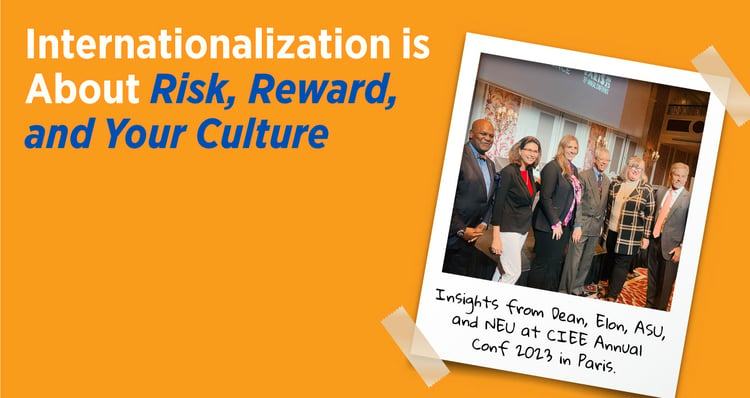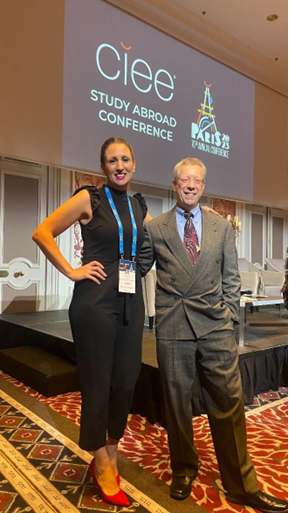
The opening plenary at the 76th CIEE conference drew a crowd earlier this month in Paris. No wonder. With a jaw-dropping panel representing Elon, Arizona State, Northeastern, and Dean College, the discussion presented some rare gems.
The goal: set the conference off on the right foot. Get everyone thinking deeply about how international experiences can reach more students.
The crowd clearly held the belief that a global education holds the promise of a brighter future. The proof was simply in the stories told by leaders in academia, government, and pretty much every institution in attendance. Those with international experience as a student spoke of the indelible mark that it had on their life and career. The global experiences changed their views of the world and shaped their decisions about how they would participate in it. No doubt, many of you can relate.
Opportunities to Meet In Person
The Intead team is gearing up for some amazing presentations and we hope you can join us.
- AIRC Annual Conference – we’ll be offering our full-day digital marketing workshop here In Phoenix, Dec 6-9, 2023
- ICEF North America Workshop in Miami, Dec 11-13, 2023
Let us know if you’ll come share a cup of coffee and a conversation about all things global and digital (info@intead.com)
Why we work so hard at this and gather to define the path forward: we are looking to make international education more accessible for current and future students. And we want those experiences to be deeply rewarding. We need to be sure the programs have a solid curriculum, strong faculty leadership, and finely tuned logistics and support services.
We can only take on so much at one time. What I heard as the specific foci at this CIEE gathering:
- Clarify the steps to improving broad student access.
- Increase our capacity to provide student mental health support services.
- Focus efforts on environmental sustainability initiatives.
The conference provided a foundation for robust, challenging discussions among study abroad leadership and all the many practitioners in the room. And these talks will continue. Fortunately, the resources to do the work, to make these ideas meaningful, not just esoteric, are in place.
The discussions embraced big visionary approaches (can we foster greater employer engagement in internationalization?) and concrete touch points (can we provide each traveling student with a sustainability cookbook customized to each of 30+ destination cities?). The ideas shared and evaluated poured forth.
Granted, there is never enough money to do all we want to do. But roughly 75 years ago, a poignant point in time following World War II, many smart and good people got together to launch global initiatives, including the United Nations, IIE, the Fulbright program, NATO, WHO, IMF, the World Bank, and CIEE to name just a few of the most prominent efforts to bridge cultures globally.
I had the great privilege of moderating the opening plenary and speaking at length with:
- Kenneth Elmore, J.D., president of Dean College
- Jennifer Malerich, Ph.D., assistant vice provost of academic and global engagement for Arizona State University
- Rebecca Kohn, Ph.D., provost and vice president of academic affairs for Elon University
- Amy Stevens, Ph.D., vice chancellor of global experiential pathways for Northeastern University
I wish all of you could have been there. That’s why today I’m sharing with you a few of my personal notes from talks with these industry leaders and other observations from the 3-day event. It’s a quick read, but one I know will spur ideas and get your wheels turning. Read on…
Look, when we preach to the converted, we have a responsibility to dig deeper, to push the envelope. We must seek relevance and progress beyond the beliefs and assumptions we all share. When you are with a planning group, a board of directors, or any team really, when you have unanimous consent, that is wonderful. It also means you are likely not pushing the envelope. Dissent and constructive disagreement mean you are testing boundaries and pushing progress. Regardless of where the group decisions take you.
Each panelist brought this mindset and their unique career perspectives to the stage. My two key takeaways: innovation requires risk-taking and culture matters (does it ever!). Be in touch for a link to the plenary recording (available soon). This event was both fun and informative. A few laughs mixed in with some very interesting and challenging approaches to study abroad.
Innovation: Risk and Reward in the Path Less Taken
ASU and Northeastern are known for long-standing investment in innovation. The leadership at these institutions embraces the risk inherent in launching and testing new ideas.
Amy spoke to experiences putting new initiatives out there and having the results miss the mark at the outset. The next step? Rather than canceling the initiative and firing the leaders (a common action at the 1-year mark when initial goals are not met), Northeastern picks the project apart, finds the inputs that prompted the low results, changes the approach, and sets the program on a stronger path. In other words, Amy supported the very essence of innovation: launch, test, analyze, improve.
Oh, if only everyone understood this concept. Your first go at something rarely produces desired results without repeated efforts and practice. Ask any successful athlete how they got so good.
So, yes, that means you have to take risks with your investments of both time and money. You have to be prepared to try again (with even more time and money). Innovation involves risk and requires perseverance. This is something we talk a lot about at Intead. Leadership must embrace this concept.

Cheese! Ben and our dynamo director of strategic marketing Britt pose for a post plenary pic.
Jennifer at ASU had very similar stories to share and the growth of both of these institutions (ASU and NEU) over the past two decades is astonishing. Especially when compared to their peers. I will venture to say that their successes emerged because of their understanding of what it takes to innovate while their peers often followed the more common path: put funding into a new initiative, don’t get the desired results right out of the gate, cancel the initiative, reprimand or fire the leaders, squelch desire to innovate across the entire institution, put funding into something new again and act surprised when the program fails. Leaders in these institutions are quick to point the finger at others who seem to consistently fail. They wonder why they cannot attract talented, strong, innovative leaders. They need to look in the mirror.A Culture of Internationalization Really Does Matter
Elon is a standout institution leading the nation in study abroad participation. 80% of Elon students study off campus during their undergraduate years. The culture of global experience as an essential element of your education runs deep here. As Rebecca told us, incoming students specifically choose Elon because of this culture. It self-perpetuates. It is a market differentiator that supports institutional growth across the board.
And Dean College stood out among the panelists because, unlike the others on stage with longstanding commitments to innovation and study abroad, Dean is setting that culture in motion today.
A strong institution in its own right, Ken told us of Dean’s investment in making international experiences a central part of the student experience. With a working-class student body, Dean is prioritizing accessible programming. For many students with jobs and families to support, a 1-week international experience holds significant learning opportunities. To be sure, a 1-week program might get a bit of side-eye from long-time internationalization practitioners. How can a student gain any real cultural appreciation or connection in this way? What kind of learning outcomes of significance can be achieved?
Absolutely good questions.
And the answer lies in the concept of perseverance and patience. Students learn incrementally. No one learns calculus or a new language with one lesson or even one semester. Learning is a process of wading into the pool of choice, getting deeper and deeper, before you swim. A 1-week international experience opens eyes to possibilities that were not there before. Practical basics: getting students to acquire a passport and taking a trip clearly facilitates future international perspectives and opportunities. As to cross-cultural learning, this is how you start.
An Exceedingly Well Run Event
This event was so well run and produced, delivering all the creative thinking and inspiration attendees could ask for. It was a high-impact kind of conference and the access to French chocolate didn’t hurt. Oh, and apparently, there is art in Paris as well. Who knew? ; -)
Importantly, conference attendees we spoke with left with a sense of energy and urgency around access, mental health support, and innovation in sustainability. Let’s keep it going. Be in touch.



